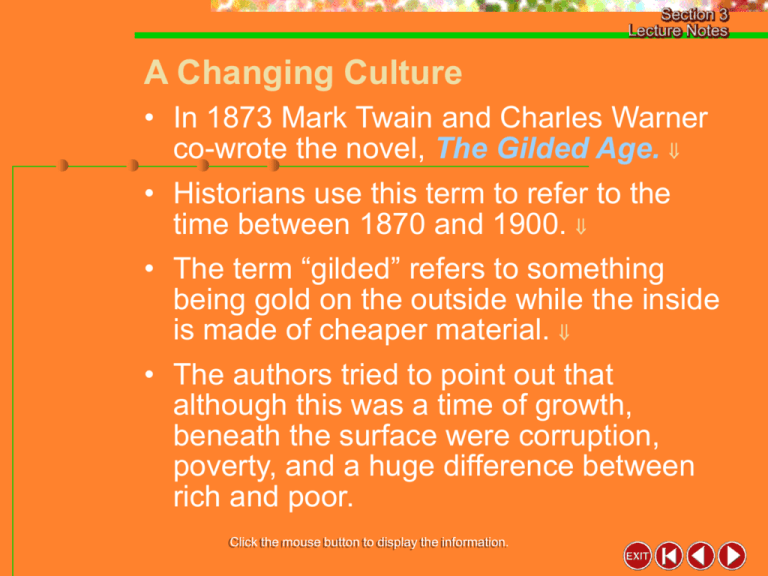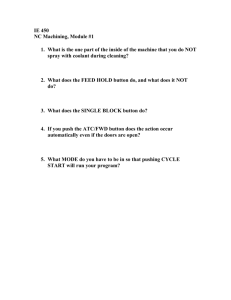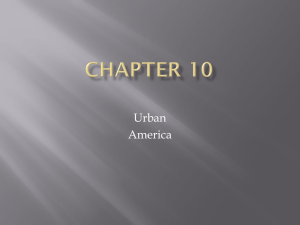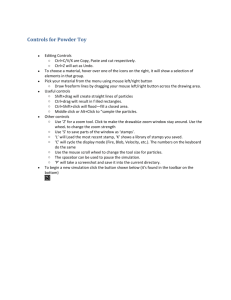A Changing Culture (cont.)
advertisement

A Changing Culture • In 1873 Mark Twain and Charles Warner co-wrote the novel, The Gilded Age. • Historians use this term to refer to the time between 1870 and 1900. • The term “gilded” refers to something being gold on the outside while the inside is made of cheaper material. • The authors tried to point out that although this was a time of growth, beneath the surface were corruption, poverty, and a huge difference between rich and poor. Click the mouse button to display the information. A Changing Culture (cont.) • Industrialization and urbanization caused Americans to look at society in a different way. • This gave way to new values, art, and forms of entertainment. • A strong belief during the Gilded Age was the idea of individualism. • This is the belief that regardless of your background, you could still rise in society. Click the mouse button to display the information. A Changing Culture (cont.) • Horatio Alger, a minister from Massachusetts, left the clergy and moved to New York where he wrote over 100 novels about rags-to-riches stories. A Changing Culture (cont.) Why did Mark Twain and Charles Warner call the era from about 1870 to around 1900 the Gilded Age? They were trying to warn people about the society during this time. “Gilded” refers to something covered in gold on the outside while the inside is cheaper. They believed that although on the surface, society appeared to shine, the inside actually held corruption, poverty, and crime. Click the mouse button to display the answer. Social Darwinism • Herbert Spencer, an English philosopher, first proposed the idea of Social Darwinism. • Spencer took Charles Darwin’s theory of evolution and natural selection and applied it to human society. • Like Darwin’s theory–that a species that cannot adapt to the environment will eventually die out–Spencer felt that human society evolved through competition. Click the mouse button to display the information. Social Darwinism (cont.) • He concluded that society progressed and became better because only the fittest people survived. • Industrial leaders agreed with Social Darwinism. • Social Darwinism paralleled laissezfaire, an economic doctrine that was opposed to government interference with business. Click the mouse button to display the information. Social Darwinism (cont.) • Many devout Christians and some leading scientists opposed the idea of Darwin’s conclusions about the origin of new species. • They rejected the theory of evolution because it went against the Bible’s account of creation. Click the mouse button to display the information. Social Darwinism (cont.) • Andrew Carnegie, a wealthy business leader, believed in Social Darwinism and laissez-faire. • However, he also felt those who profited from society should give something back, so he softened Social Darwinism with his Gospel of Wealth. • This philosophy stated that wealthy Americans were responsible and should engage in philanthropy, using great fortunes to further social progress. Click the mouse button to display the information. Social Darwinism (cont.) Why were devout Christians and some science leaders against Social Darwinism? They rejected the theory of evolution because it went against the Bible’s account of creation. Click the mouse button to display the answer. Realism • A new movement in art and literature, called realism, portrayed people in realistic situations instead of idealizing them as the romantic artists had done. • Thomas Eakins, a painter from Philadelphia, observed and painted day-to-day living in a realistic fashion. • He used realistic detail and precise lighting. Click the mouse button to display the information. Realism (cont.) • Writer and literary critic William Dean Howells wrote realistically about American life. • He also recognized talent in several writers of this time, including Mark Twain, who wrote Adventures of Huckleberry Finn in 1884. • Twain is thought to have written the first true American novel. • Henry James, an English writer, portrayed the lives of the upper class in his 1881 novel, Portrait of a Lady. Click the mouse button to display the information. Realism (cont.) • Edith Wharton won a Pulitzer Prize for the novel The Age of Innocence, which portrayed the complicated lives of the upper-class in New York in the 1870s. Realism (cont.) How did the realism movement in art and literature differ from that of the romantic artists? The realism movement portrayed people realistically. It did not attempt to idealize people as the romantics did. Click the mouse button to display the answer. Popular Culture • Popular culture changed in the late 1800s. • People had more money to spend on entertainment and recreation. • Work became separate from home. • People looked to have fun by “going out” to public entertainment. • During the 1800s, the saloon acted like a community and political center for male workers. • It offered free toilets, water for horses, free newspapers, and free lunches. Click the mouse button to display the information. Popular Culture (cont.) • Coney Island in New York was an amusement park that attracted working class families and single adults. • It offered amusements such as water slides and railroad rides. • Watching sports became very popular in the late 1800s. • Baseball began to appear in the United States in the early 1800s. Click the mouse button to display the information. Popular Culture (cont.) • In 1869 the first salaried team, the Cincinnati Red Stockings, was formed. • Football and basketball also became popular during this time. • In the early 1880s, vaudeville became popular. • It was adapted from the French theater and combined animal acts, acrobats, gymnasts, and dancers in its performance. Click the mouse button to display the information. Popular Culture (cont.) • During this time, people began enjoying ragtime music. • The most famous African American ragtime composer was Scott Joplin, who became known as the King of Ragtime. Click the mouse button to display the information. Popular Culture (cont.) What were some of the changes in popular culture during this time? People had more money to spend during this time. As a result, they spent money on entertainment and recreation. They were also willing to leave their homes to go out in public to have fun. Click the mouse button to display the answer.






